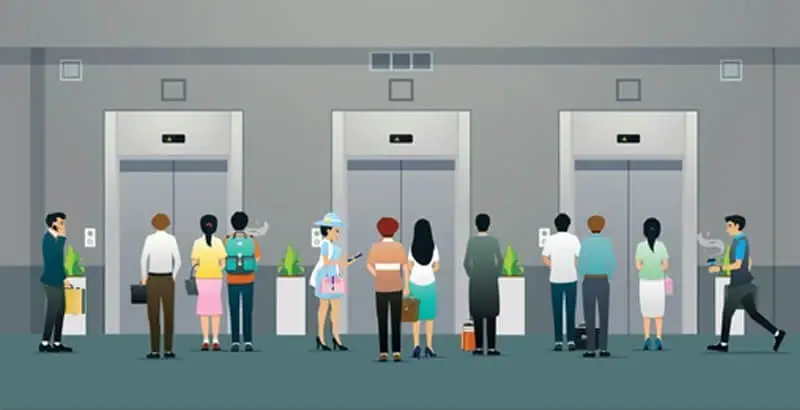What Does Elevator Capacity Mean?
While determining the elevator’s design, you must keep in mind what purpose your building is going to serve. If it is for some business, commercial purposes, or residential purposes, you must determine the capacity of an elevator before choosing its design.
Elevator capacity refers to the maximum weight an elevator can hold by ensuring safety and efficiency. Typically an elevator’s capacity is from 2100 lbs. to 5000 lbs.
Factors Determining Elevator Capacity
The elevator’s size and its capacity are directly proportional to each other. In other words, the bigger an elevator is, the more weight it can carry safely.
However, an elevator’s size is one of the factors that determine its capacity, it is not the ultimate factor. Other factors contribute to a perfect choice for required capacity and usage. These include the material of an elevator, the height of the building, and how the cab is lifted.
By way of illustration, if an elevator is used in a residential building, It has to carry less weight because there are fewer people and less use.
To add, it also depends upon the building’s height, there must be certain precautions need to be taken regarding strength and stronghold.

How to Calculate Elevator Capacity in Terms of Number of People?
There are three ways to determine an elevator’s capacity.
1. Maximum Loading
We call it Max Load which maximum number of people an elevator can accommodate. There are certain exceptional cases when people more than the required limit get into the elevator, which makes the ride quite risky.
For the Max Load calculation, 1.5 square feet of space is specified for each person. Divide the total area in square feet over 1.5 square feet and you’ll get the maximum number of people an elevator can hold.
2. Normal Load
Normal weight is the recommended number of people or the amount of load for an efficient ride.
Although it is being labeled as a Normal Load, it appears crowded for some people. If there is heavy traffic, passengers may have to wait for the next available ride. In such a situation, the elevator must with an average of 10-12% within five minutes.
To calculate the total normal load, consider 2.3 square feet of space per person. Divide the total area in square feet over 2.3 square feet and you’ll get the maximum number of people an elevator can hold.

3. Special Loading
As the name suggests, Special Loading is quite different from the above two types as it’s used differently. This is meant to be used in buildings that provide shelter to travelers with large-scale equipment or goods. Due to this, the elevator has less capacity for conveyance.
When calculating the exceptional load, you must account for approximately half of the typical loading. Apply recommended load calculations to avoid risk factors.
Weight Limit Considerations
The weight of people and their belongings add complexity to the capacity puzzle as it becomes more necessary to determine the weight and capacity of the elevator.
Once you determine elevator capacity, add it to the building’s codes and regulations. Moreover, mention the elevator’s specifications to avoid any kind of accident.
To calculate the weight limit of an elevator, consider the following factors other than the number of people.
● Average Passenger Weight: Determine the average weight of the passengers. The common standard is around 150-200 pounds or 68-91 kgs per person.
● Additional Load: Consider all kinds of additional loads, such as carts or luggage. Keep in mind the typical weight a passenger can carry or carries. Assign weight to these items and calculate it with the passenger’s weight and number of passengers.
● Adding Additional Load: Calculating total weight is an easy task.
Total Weight = Total Passenger weight × Additional Load Weight
Adding Total Passenger Weight
To determine total passenger weight, multiply the number of people with the average weight of the people.
Total Passenger weight = Number of Passengers × Average Passengers Weight
Safety Factor
The safety factor is a percentage you should add to the weight calculations to ensure that the elevator works within safety limits. It depends upon the local standards and industry regulations.
Typically it ranges from 10% to 25%.
Total Weight with Safety Factor = Total Weight + (Total Weight × Safety Factor)
Conclusion
It is crucial to know how to calculate elevator capacity to prioritize safety. Regular maintenance to meet the standards is the primary element. Whenever you step into the process of building and interior designing, marvel at the art of knowing all invisible calculations. Elevator capacity, after all, is the backbone of our vertical adventure.
FAQs
How often should elevator capacity calculations be reviewed?
Regular review is recommended—other than that, review calculations after every modification you make in the elevator.
Are there legal Implications for exceeding the weight limit?
Yes, there are serious legal implications for exceeding weight limits. It poses a significant risk to the safety of the passengers.
